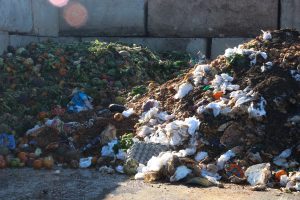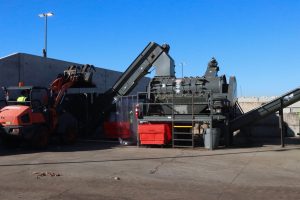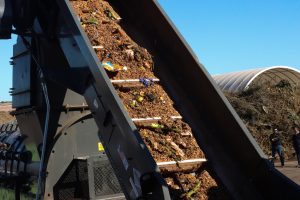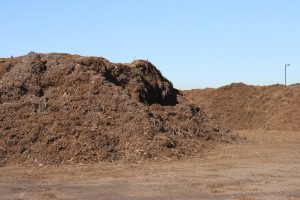- Slug: BC-CNS-Phoenix Composting. 600 words.
- 4 photos (captions and thumbnails below).
By Grace Mack
Cronkite News
PHOENIX — New technology is helping Phoenix divert food waste from landfills and turn it into clean compost.
A “depackager,” which separates food and beverages from their plastic wrapping, was installed at the Phoenix Public Works’ 27th Avenue Compost Facility in September, but got its first real test this month with extra trash generated by thousands of visitors who attended events associated with the Super Bowl and Waste Management Phoenix Open.
“We’re very excited for it simply because we’ve never been able to take food scraps in at this level,” said Phoenix Public Works Deputy Director Eduardo Rodriguez. Previously, food waste would have had to be manually sorted.
The Denali depackager technology pulls packaging, wrappers and other trash away from the food waste. Trash comes out one side and organic material comes out the other. The food waste is then ready to begin composting. It can process up to 15 tons per hour.
Items that are not compostable are sent to the landfill while the compostable material is mixed with green waste, which are items like branches, leaves and shrubs.
This process is finished after 45 to 60 days, then the clean compost is distributed to plant nurseries and community gardens.
WeCare Organics merged with Denali Water Solutions in 2016 and is one of the largest compost processing companies in the U.S., operating mainly in the Northeast. The 27th Avenue plant is its first compost facility in the West.
Built in 2017, the city composting facility can process about 55,000 tons of green organic material per year, with a future capacity to process 220,000 tons of compost. In addition to the amount of compost it can process, it can turn the green waste into compost in nearly half the time as traditional methods using a state-of-the-art “Turned Aerated Pile” system, according to Phoenix Public Works.
“It’s going to be one of the best programs in the nation,” Denali General Manager Oscar Rodriguez said. “There’s nothing really going on here in the state of Arizona that does anything like this.”
The depackager processes food waste from Arizona State University, the Phoenix Convention Center and several school districts, according to Spencer Blake, senior public information officer for the city of Phoenix. He said Denali paid for the depackaging machine.
Eduardo Rodriguez estimated that in the weeks leading up to this year’s Super Bowl, 2,000 tons of food and packaging waste was created at downtown Phoenix Super Bowl events.
Phoenix Public Works set a goal for a zero waste Super Bowl. Zero waste means diverting a minimum of 90 percent of waste away from landfills, according to a U.S. Environmental Protection Agency survey of localities across the country.
“If we’re able to capture even a percentage of that, there’s a definite plus. And it definitely takes us to that zero waste goal,” Eduardo Rodriguez said.
The city asked that everyone help the effort by separating organic material from trash and recyclables when attending Super Bowl events.
If consumers had not received the message, “zero waste volunteers” helped people discard their waste in the correct bins so that the sorting process could be more efficient.
“Food waste is one of the biggest resources that we lose,” the city’s Rodriguez said. “Before, it would all go straight to the trash. If we’re able to divert that, then that’s just a big value behind that.”
Blake said the depackager was a “great success at managing the Super Bowl’s food waste.” He said the city will soon share metrics concerning how much waste was actually diverted from landfills during Super Bowl events.
For more stories from Cronkite News, visit cronkitenews.azpbs.org.



